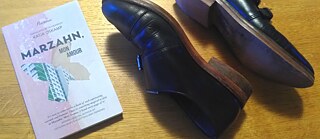January 2023
Katja Oskamp: Marzahn, mon amour

Fans of James Herriot‘s gentle humour will enjoy Katja Oskamp’s Marzahn, mon amour.
I discovered an uncomfortable truth about myself while reading Katja Oskamp’s Marzahn, mon amour (tr. Jo Heinrich). It turns out I really, really don’t like descriptions of feet. Feet themselves? Not a problem. The idea of having a pedicure? Lovely. The description of someone else having a pedicure? Eeek.
And yet despite this apparently long dormant phobia, I found much to love in Oskamp’s autobiographical tales about her work as a chiropodist in Marzahn, an area on the outskirts of Berlin synonymous for Germans with concrete and neo-Nazis. Oskamp though isn’t interested in stereotypes – neither in those demonising the former East, nor in those nostalgic for it – and instead turns an open and compassionate gaze on the network of people whose lives she becomes a small part of. Vignettes of Oskamp’s interactions with her customers make up most of Marzahn, mon amour, and they form the book’s heart – a gentle, sometimes wry, always warm heart. For all that Marzahn is a world away from rural Yorkshire, this warmth – and the lit-up faces of friends whenever I mentioned the book – somehow put me in mind of James Herriot and the way that human interactions always become the centre of his own gentle tales.
The book opens in “the middle years, when you’re neither young nor old,” when Oskamp – weary and by her own account bitter and invisible – makes the choice to train as a chiropodist, along with a group of women with vastly different backgrounds and experiences and yet all “women like us, middle-aged mothers, eager and obedient, nameless players in a nameless midfield, relegated to the footnotes of our own lives.” Oskamp’s eye for observation becomes clear in these early pages, as does her interest in the people society deems invisible: the women too old to be cast in a romcom, and above all her elderly customers – like Frau Guse, who is “slowly distancing herself and reversing away from the world she used to know her way around”.
Perhaps the book strikes a particular chord in a post-lockdown world, when we came to recognise how important touch is to our emotional well-being, and when we came to value our casual interactions with not quite strangers – hairdressers, shop staff and for some, I’m sure, chiropodists – in a new light for having had to go without them. Writing several years before we were deprived of these interactions, Oskamp already has a sense of the importance of the small talk we so frequently malign: “the professional knows that the exchange of information makes up merely a fraction of all communication, the vast majority of which is something else altogether, and Frau Guse and I are playing around with this vast majority in perfect harmony.” Oskamp‘s work is – luckily for my newly discovered sensitivities – only partly a matter of feet. It is just as much about people, about compassion and dignity and respect.
About the author
Annie Rutherford makes things with words and champions translated literature in all its guises. A writer, translator and events organiser, she's currently researching the possibility of setting up a Writers in Exile residency in Edinburgh, and also runs Lighthouse Bookshop's Women in Translation book group. She can spot a misplaced apostrophe at a distance of fifty yards.Reserve the original German title of Marzahn, mon amour in our Glasgow library.
Reserve the English translation of Marzahn, mon amour in our London library.
E-Library: Borrow the original German title of Marzahn, mon amour digitally.
Find out more about the blog.
Book Blog Overview